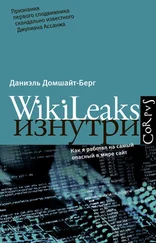Harding, Luke - WikiLeaks - Inside Julian Assange's War on Secrecy
Здесь есть возможность читать онлайн «Harding, Luke - WikiLeaks - Inside Julian Assange's War on Secrecy» весь текст электронной книги совершенно бесплатно (целиком полную версию без сокращений). В некоторых случаях можно слушать аудио, скачать через торрент в формате fb2 и присутствует краткое содержание. Жанр: Старинная литература, на английском языке. Описание произведения, (предисловие) а так же отзывы посетителей доступны на портале библиотеки ЛибКат.
- Название:WikiLeaks: Inside Julian Assange's War on Secrecy
- Автор:
- Жанр:
- Год:неизвестен
- ISBN:нет данных
- Рейтинг книги:3 / 5. Голосов: 1
-
Избранное:Добавить в избранное
- Отзывы:
-
Ваша оценка:
- 60
- 1
- 2
- 3
- 4
- 5
WikiLeaks: Inside Julian Assange's War on Secrecy: краткое содержание, описание и аннотация
Предлагаем к чтению аннотацию, описание, краткое содержание или предисловие (зависит от того, что написал сам автор книги «WikiLeaks: Inside Julian Assange's War on Secrecy»). Если вы не нашли необходимую информацию о книге — напишите в комментариях, мы постараемся отыскать её.
WikiLeaks: Inside Julian Assange's War on Secrecy — читать онлайн бесплатно полную книгу (весь текст) целиком
Ниже представлен текст книги, разбитый по страницам. Система сохранения места последней прочитанной страницы, позволяет с удобством читать онлайн бесплатно книгу «WikiLeaks: Inside Julian Assange's War on Secrecy», без необходимости каждый раз заново искать на чём Вы остановились. Поставьте закладку, и сможете в любой момент перейти на страницу, на которой закончили чтение.
Интервал:
Закладка:
When Assange was 13 or 14, his mother had rented a house across the street from an electronics shop. Assange began going there and working on a Commodore 64. His mother saved to buy the computer for her older son as a present. Assange began teaching himself code. At 16 he got hold of his first modem. He attended a programme for gifted children in Melbourne, where he acquired “an introverted and emotionally disturbed” girlfriend, as he put it. Assange grew interested in science and roamed around libraries. Soon he discovered hacking. By the age of 17 he suspected Victoria police were about to raid his home. According to Underground : “He wiped his disks, burnt his printouts, and left” to doss temporarily with his girlfriend. The pair joined a squatters’ union, and when Assange was 18 she became pregnant. They married and had a baby boy, Daniel. But as Assange’s anxiety increased, and police finally closed in on his outlaw circle of hackers, his wife moved out, taking their 20-month-old son Daniel with them. Assange was hospitalised with depression. For a period he slept outdoors, rambling around the eucalyptus forests in Dandenong Ranges national park.
*
Human relationships must have seemed unstructured for the teenage Assange, prone to abandonment, confusion and reversals. The world of computers, on the other hand, was predictable. Algorithms – the key to Assange’s later skill as a cryptographer – were reliable. People were not. Assange would later tell the New Yorker the “austerity” of interaction with computers appealed to him. “It is like chess … There is no randomness.” During his 1996 hacking trial his defence lawyer, Paul Galbally, said in mitigation that his computer became “his only friend”. As Assange shifted from school to school he was targeted by bullies as the outsider: “His only real saviour in life or his own bedrock in life was this computer. His mother, in fact, encouraged him to use this computer … It had become an addictive instrument to him at a very early age.” Galbally describes Assange as “super smart”; not a nerdy hacker but someone unusual and flamboyant.
Interestingly, some of the world’s most talented programmers come from broken families. Jacob Appelbaum, who would become WikiLeaks’ representative in the US, says he was the son of a paranoid schizophrenic mother and heroin addict father. He spent much of his boyhood in a children’s home. As a boy, he discovered a woman convulsing in his father’s bathroom with a needle sticking out of her arm. Appelbaum told Rolling Stone magazine that programming and hacking allowed him, however, “to feel like the world is not a lost place. The internet is the only reason I’m alive today.”
Melbourne’s hacking underground in the 1980s, in which Assange became prominent, was a small, almost entirely male group of self-taught teenagers. Many came from educated but poor suburban homes; all were of above average intelligence. They experimented on Commodore 64s, and the Apple IIe. They wrote code and used painfully slow modems. There was no internet yet, but there were computer networks and bulletin board systems, known as BBSs. In his “real” life Assange might have been considered a failure. He failed to complete his Higher School Certificate via a correspondence course. He also studied computers and physics inconclusively at an adult further education college.
But in his electronic life, Assange was a god. These geeky and socially awkward young men could reinvent themselves as swaggering heroes with names like Phoenix, Gandalf or Eric Bloodaxe. Assange used the pseudonym Mendax. Lewis and Short’s Latin dictionary says that means “given to lying” – the root for the English word mendacious. But Assange was more specifically inspired by Horace’s Odes . Assange’s mother had enthusiastically introduced him to the Greek and Latin classics. In book III, xi, Horace tells the story of the 50 daughters of Danaus. Their father is angry that they are being forced to marry their cousins, the sons of Aegyptus. He makes them swear to kill their husbands on their wedding night. Forty-nine carry out his order, but the 50th, Hypermnestra, tips off her husband, Lynceus, and they escape. (In some versions they go on to found a dynasty.) For this Horace calls her splendide mendax or “splendidly deceiving”. Another translation could be “deceitful with glory”. The name was well picked. It evoked what the intensely ambitious Assange would do next, something both deceitful and glorious: hack into the US’s military network.
Underground: tales of hacking, madness & obsession on the electronic frontier appeared in 1997. Published under the byline of Suelette Dreyfus, a Melbourne academic, Assange is credited as researcher, but his imprint his palpable – in parts it reads like an Assange biography. The book depicts the international computer underground of the 90s: “a veiled world populated by characters slipping in and out of the half-darkness. It is not a place where people use their real names.” Assange chose an epigraph from Oscar Wilde: “Man is least himself when he talks in his own person. Give him a mask, and he will tell you the truth.”
“Sometimes Mendax went to school,” runs the story in Underground . “Often he didn’t. The school system didn’t hold much interest for him. It didn’t feed his mind … The Sydney computer system was a far more interesting place to muck around in than the rural high school.”
In 1988, Assange (Mendax) is busy trying to break into Minerva, a system of mainframes in Sydney belonging to the government-owned Overseas Telecommunications Commission, or OTC. For the computer underground, hacking into OTC was a sort of rite of passage.
Mendax phones an OTC official in Perth posing as an operator from Sydney, Underground describes. To add authenticity, he records his home printer chattering in the background, and even mumbles passages from Macbeth to simulate office noise. The official innocently reveals his password – LURCH. Mendax is in! It is one of the dramatic moments in the book. In 2010, recalling his hacker exploits as a teenager, Assange said, “You were young. You hadn’t done anything for criminal gain. You had done this for curiosity, challenge, and some activism. We hadn’t destroyed anything. If you were a teenager in a suburb of Melbourne this was an incredibly intellectually liberating thing.”
In 1989 Melbourne hackers carried out a spectacular stunt, launching a computer worm against Nasa’s website. Bemused Nasa staff read the message: “Your system has been officially WANKed.” The acronym stood for Worms Against Nuclear Killers. Was Assange behind WANK? Possibly. But his involvement was never proved. By 1991 Assange was probably Australia’s most accomplished hacker. He and two others, using the names Prime Suspect and Trax, founded International Subversives magazine, offering tips on “phreaking” – how to break into telephone systems illegally and make free calls. The magazine had an exclusive readership: its circulation was just three, the hackers themselves.
Assange next set about hacking into the master terminal of Nortel, a big Canadian company that manufactured and sold telecommunications equipment. He also penetrated the US military-industrial complex, using his own sophisticated password-harvesting program, Sycophant. He hacked the US Airforce 7th Command Group Headquarters in the Pentagon, Stanford Research Institute in California, the Naval Surface War Center in Virginia, Lockheed Martin’s Technical Aircraft Systems plant in California, and a host of other sensitive military institutions. In the spring of 1991, the three hackers found an exciting new target: MILNET, the US military’s own secret defence data network. Pretty quickly, Assange discovered a back door. He got inside. “We had total control over it for two years,” he later claimed. The hackers also routinely broke into the computer systems at Australia’s National University.
Читать дальшеИнтервал:
Закладка:
Похожие книги на «WikiLeaks: Inside Julian Assange's War on Secrecy»
Представляем Вашему вниманию похожие книги на «WikiLeaks: Inside Julian Assange's War on Secrecy» списком для выбора. Мы отобрали схожую по названию и смыслу литературу в надежде предоставить читателям больше вариантов отыскать новые, интересные, ещё непрочитанные произведения.
Обсуждение, отзывы о книге «WikiLeaks: Inside Julian Assange's War on Secrecy» и просто собственные мнения читателей. Оставьте ваши комментарии, напишите, что Вы думаете о произведении, его смысле или главных героях. Укажите что конкретно понравилось, а что нет, и почему Вы так считаете.












